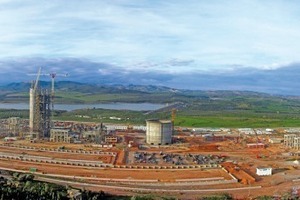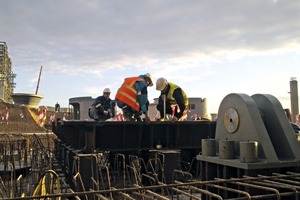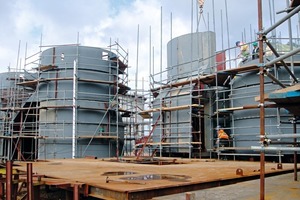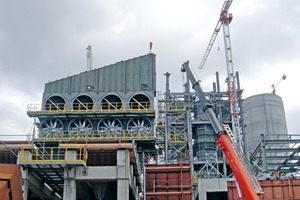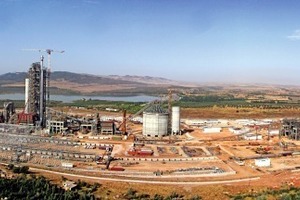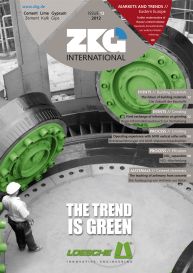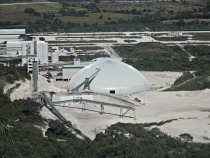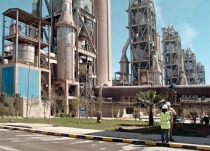North Africa's technologically most advanced cement plant
Teamwork in construction and realization
In many ways, Djebel Ressas is an excellent example of a well managed cement project. Despite starting the promotion of the project in the middle of the financial crisis, the sponsors of the project managed in less than two years to create one of the most promising Tunisian cement manufacturers, Carthage Cement, who will operate the largest and probably the most efficient and environmentally friendly cement plant in Tunisia.
State-of-the-art technology
Overall transparency
Perfect logistics on site and for machinery delivery
Commissioning phase
These questions can be resolved by an operations and maintenance (O&M) contract. Carthage Cement signed a contract with NLSupervision, part of the FLSmidth Group, for the O&M of Djebel Ressas, including a guaranteed production for five years. This O&M contract means that FLSmidth is committed to ensuring the efficient operation of Djebel Ressas and to maintaining it in premium condition for the next five years.
There is significant value in an O&M contract for the customer. Apart from the obvious benefit of a guaranteed production capacity – NLSupervision guarantees to meet 1.8 million tons of clinker per year at Djebel Ressas, including the very first year – there are the additional benefits that come from the technical and commercial expertise that an experienced O&M company offers. This is particularly helpful in the case of Carthage Cement, a relative newcomer to the cement industry in Tunisia.
NLSupervision specialises in offering everything needed for the successful setup and implementation management, operation and maintenance of a cement plant. At Djebel Ressas, this means that the NLSupervision team is on site, carrying out preparatory setup and implementation work before the Provisional Acceptance Certificate (PAC) is signed. During this time, the contractual responsibility still lies with the project and commissioning team but once the PAC is signed after commissioning is complete (expected to be 2Q 2013), then NLSupervision will take over full responsibility for running the plant and the five year contract begins.
The preparatory stage is very important; NLSupervision ensures that everything is in place before the PAC, ready for when the plant can begin operation. Under the contract, NLSupervision is responsible for supplying everything required to operate a cement plant, including spare parts, consumables, safety clothes, and maintenance programmes as well as lots of other things, which will all help to guarantee maximum operational stability.
One of the first tasks for NLSupervision after the contract was signed was to set up a local subsidiary in Tunisia: NLSupervision Tunisia, which is owned by NLSupervision. This is the first NLSupervision office of its kind to be fully integrated with the FLSmidth IT system. This setup essentially means that the IT infrastructure at NLSupervision Tunisia enjoys total compatibility with the IT facilities used at FLSmidth headquarters in Copenhagen. This has some great benefits: everything runs more smoothly due to the standardisation of equipment and software licenses, and workers in Tunisia receive exactly the same IT support as if they were sitting in Denmark. This IT integration has also helped to give the employees at Djebel Ressas a sense of being part of the wider FLSmidth Group.
The computerised maintenance system, Maximo, which is a key tool in the efficient running of the plant with all vendor documents stored in the system, informs the maintenance manager exactly when maintenance has to take place on all the equipment. Maximo also holds important information about the stock that needs to be in the warehouse and when and what needs to be purchased for the plant to run smoothly.
Maximo has also been centrally installed and made fully secure, so that this complex system is protected. Having a centralised Maximo installation means that there is only one system to update and maintain and that the back-up is all done at one central location in Denmark. After commissioning, there will be around 30 people at Djebel Ressas who will use Maximo. In February 2012, NLSupervision hired a Maximo administrator who took part in the installation process, together with FLSmidth Wadgassen and the IT team. This was another part of the process to ensure that the handover after commissioning goes smoothly and production capacity can get up to speed quickly.
Djebel Ressas illustrates the FLSmidth Group’s unique capacity to take on a complete plant. NLSupervision can therefore ensure consistently high standards, a smooth transition and ultimately substantial savings for Carthage Cement.

